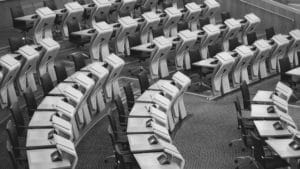It’s the final week of business at the Scottish Parliament before the week-long February recess. Natalie Mauchline looks at some of the issues that might make the Scottish political headlines this week.
Brexit and the Malthouse Compromise
The Prime Minister’s victory last week may prove to be short-lived as she heads back to Brussels with the hope of gaining concessions on the Irish backstop. The EU immediately dismissed the possibility of a renegotiation following a majority vote in the Commons, which asserted that MPs would be happy to vote for the Withdrawal Agreement if changes are made to the backstop. If the Prime Minister is unsuccessful, she risks the breakup of her fragile coalition of supporters who contributed to her victory last week. The Malthouse Compromise has emerged as the front runner for a way forward. This is a proposal to replace the backstop with alternative technological arrangements as a way of preventing a hard border in Ireland. This line of action would allow for an extension to the transition period, in an attempt to soften the UK’s exit from the EU. This evening, Nicola Sturgeon will speak about Brexit at Georgetown University in Washington DC and a statement on Brexit preparations is scheduled for Wednesday afternoon.
Scottish Budget Fallout
Last week, the Scottish Budget passed in Holyrood, thanks to a deal with the Scottish Greens in exchange for greater spending powers for local authorities. The proposed parking levy, which would allow councils to impose a workplace parking levy to discourage professionals from driving to work, has emerged as one of the more controversial measures. The EIS and the Scottish Conservatives have already called for teachers to be exempt from the rule as it could force teachers to quit their jobs. The deal with the Greens has also allowed the Tourist Tax to become a reality if local authorities decide to impose it. In response to the news, the Scottish Tourism Alliance argued that a Transient Visitor Levy would “deliver a significant blow” to the tourism industry. The Finance & Constitution Committee will consider Stage 2 amendments to the Budget Bill with Derek Mackay on Wednesday.
Edinburgh-London Relations
On Tuesday, several senior Scottish officials will appear before the Scottish Affairs Committee to give evidence on the working relationship between the UK and Scottish governments. Witnesses providing evidence to the Committee include Lord Wallace, former Deputy First Minister of Scotland, Lord McConnell, former First Minister of Scotland, and Alun Evans, former Director of the Scotland Office. The inquiry hopes to find out what support can be given to improve intergovernmental relations, what machinery should be put in place after Brexit and what lessons can be learned from how other states manage relations across government levels.
Justice Reform
Both the Vulnerable Witness Bill and the Management of Offenders Bill will be debated at Stage 1 this week. The Vulnerable Witness Bill aims to reduce the trauma for witnesses of crime by allowing them to give evidence away from a court setting. The Bill focuses on child witnesses, but its provisions could then be extended to adults in situations deemed appropriate. In its Stage 1 report, the Justice Committee called on the Scottish Government to introduce the Barnahus model, which would enable treatment, interviews and support for witnesses to be based in one facility. The Management of Offenders Bill aims to make provision for the use of electronic tags and a better system for reintegrating offenders into the community. While taking evidence, the Justice Committee called for a more robust risk assessment system to reduce reoffences and breaches of parole.
Education Inquires
The Education & Skills Committee has announced an inquiry into whether Scottish pupils have enough choice of school subjects and whether the choice of subjects has narrowed. A possible reduction in subject choice could have an impact on a pupil’s university or job choice. This week, the Committee will continue its inquiry into standardised testing as it hears evidence from the Educational Institute of Scotland and others. Meanwhile, teachers will continue to vote on whether or not to accept the Government’s most recent pay offer.



